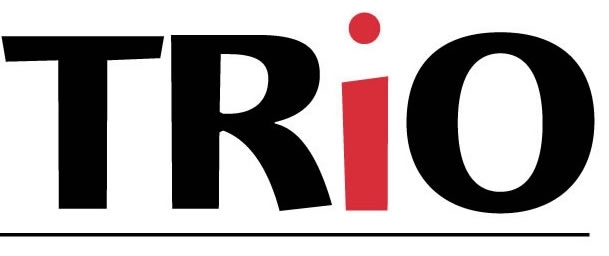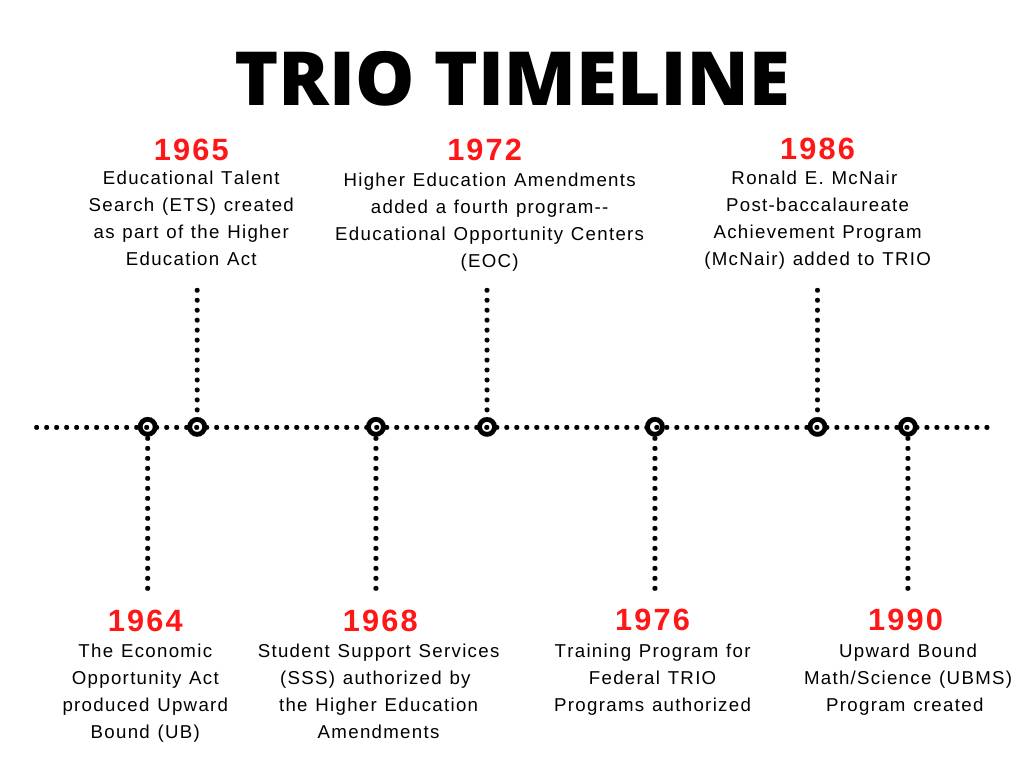What is TRIO?

What are TRIO Programs?
The Federal TRIO Programs (TRIO) are Federal outreach and student services programs designed to identify and provide services for individuals from disadvantaged backgrounds. TRIO includes 8 programs targeted to serve and assist limited-income individuals, first-generation college students, and individuals with disabilities to progress through the academic pipeline from middle school to post-baccalaureate programs. TRIO also includes a training program for directors and staff of TRIO projects.
The recipients of the grants, depending on the specific program, are institutions of higher education, public and private agencies and organizations including community-based organizations with experience in serving disadvantaged youth and secondary schools. Combinations of such institutions, agencies, and organizations may also apply for grants. These entities plan, develop and carry out the services for students. While individual students are served by these entities, they may not apply for grants under these programs.
Nationally, more than 3,100 programs serve close to 800,000 low-income/first-generation students and students with disabilities – from sixth grade through college graduation. TRIO programs provide academic tutoring, personal counseling, mentoring, financial guidance, and other supports necessary for educational access and retention. TRIO programs provide direct support services for students and relevant training for both directors and staff.
Where did TRIO Originate?
The TRIO programs were the first national college access and retention programs to address the serious social and cultural barriers to education in America. TRIO began as part of President Lyndon B. Johnson’s War on Poverty. The Educational Opportunity Act of 1964 established an experimental program known as Upward Bound. Then, in 1965, the Higher Education Act created Talent Search. Finally, another program, Special Services for Disadvantaged Students (now known as Student Support Services), was launched in 1968. Together, this “TRIO” of federally-funded programs encouraged access to higher education for low-income students. By 1998, the TRIO programs had become a vital pipeline to opportunity, serving traditional students, displaced workers and veterans. The original three programs have grown to eight, adding Educational Opportunity Centers (1972), Training Program for Federal TRIO programs (1976), the Ronald E. McNair Post-Baccalaureate Achievement Program (1986), Upward Bound Math/Science (1990) and the TRIO Dissemination Partnership (1998).
History of TRIO Programs
The history of TRIO is progressive. It began with Upward Bound, which emerged out of the Economic Opportunity Act of 1964 in response to the administration's War on Poverty. In 1965, Talent Search, the second outreach program, was created as part of the Higher Education Act. In 1968, Student Support Services, which was originally known as Special Services for Disadvantaged Students, was authorized by the Higher Education Amendments and became the third in a series of educational opportunity programs. By the late 1960's, the term "TRIO" was coined to describe these federal programs in honor of the first three programs.
Over the years, the TRIO Programs have been expanded and improved to provide a wider range of services and to reach more students who need assistance. The Higher Education Amendments of 1972 added the fourth program to the TRIO group by authorizing the Educational Opportunity Centers. The 1976 Education Amendments authorized the Training Program for Federal TRIO Programs, initially known as the Training Program for Special Programs Staff and Leadership Personnel. Amendments in 1986 added the sixth program, the Ronald E. McNair Post-baccalaureate Achievement Program. Additionally, in 1990, the Department created the Upward Bound Math/Science program to address the need for specific instruction in the fields of math and science. The Upward Bound Math/Science program is administered under the same regulations as the regular Upward Bound program, but it must be applied for separately. Finally the Omnibus Consolidated Appropriations Act of 2001 amended the Student Support Services (SSS) program to permit the use of program funds for direct financial assistance (Grant Aid) for current SSS participants who are receiving Federal Pell Grants.

Why Are TRIO Programs Important?
TRIO programs create necessary avenues for students from disadvantaged backgrounds to succeed in school and gain access to help, both financially and academically. Often first-generation, low-income individuals struggle to find the social, academic, and financial capital to pursue and succeed in higher education.
The US Department of Education oversees all TRIO Programs. For more information visit their site: https://www2.ed.gov/about/offices/list/ope/trio/index.html
